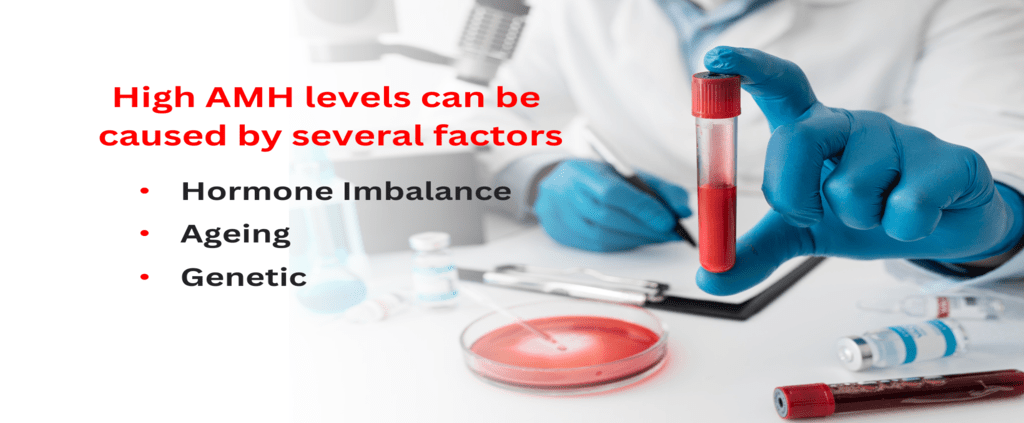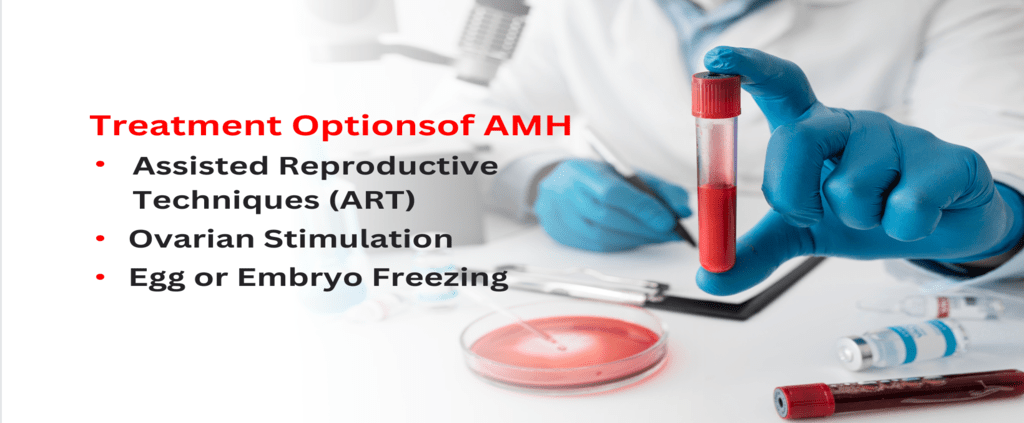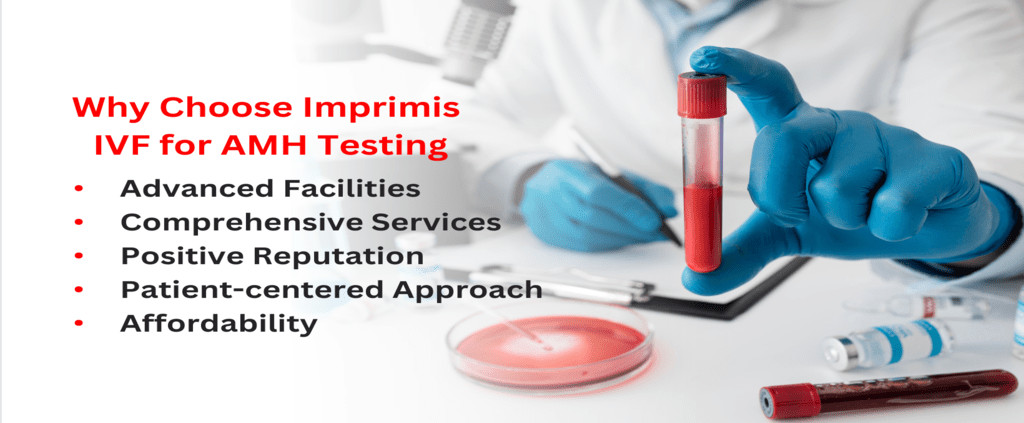What is AMH Test – Purpose, Levels, and Treatment
What is AMH Test – AMH is a female hormone produced by the ovaries. An anti-mullerian hormone is so named because it binds to receptors on cells that line the inside of the fallopian tubes. These receptors are part of a complex system that assists sperm in approaching and fertilizing an egg.
Your doctor may additionally order an AMH test to identify an ovarian mass. An AMH test is a simple blood test; if you take it after your period begins and before ovulation (the release of an egg from one ovary), you may see results in one week or less. An AMH test determines anti-mullerian hormone levels related to an individual’s egg count. It is related to your egg count but does not predict your fertility.
Importance of AMH Levels
AMH levels are essential for determining your ovarian reserve but don’t directly correlate with age. AMH levels increase as you age. After menopause, a woman’s AMH level increases as she ages. The higher the AMH level, the more eggs and ovarian reserve.
AMH levels also vary between women.
Some women have more eggs than others, which means they can produce more eggs in their ovaries. It is called having a high ovarian reserve. Others may have fewer eggs or a lower ovarian reserve, which means they may not be able to produce as many eggs in their ovaries and could experience infertility issues if they decide to get pregnant.
Purpose of the AMH Test
AMH is a hormone that’s produced by the ovaries. It helps maintain an egg’s structure and signals the brain to release hormones that make it possible for a woman to conceive.
The test aims to determine whether or not you are at risk for developing cervical cancer. A positive result means that you might have an increased risk of developing cervical cancer and should undergo regular screening tests for this disease.
The AMH test also helps in assessing ovarian reserve. Suppose you have low or no measurable levels of AMH. In this particular situation, you might be at risk for diminished ovarian reserve or premature menopause — two conditions affecting your fertility options and quality Of life.
Predicting Response to Fertility Treatments:
The test is commonly performed on postmenopausal women to check for signs of estrogen deficiency or osteoporosis, but it can also be used to assess ovarian reserve and fertility status. In some cases, women may request an AMH test if they have irregular periods or have had their uterus removed due to cancer treatment.
AMH Levels
A higher number means more eggs in your ovaries, which means more egg follicles to help produce healthy eggs. A lower number means you may produce fewer eggs than before and may soon lose those eggs.
A woman’s AMH levels are usually between 1.0 ng/mL to 3.0 ng/mL. (nanograms per millilitre). It is the level at which ovulation is most likely to occur, usually within this range.
Low AMH levels, under 1.0 ng/mL, may indicate that the pituitary gland functions normally. The presence of abnormally low levels of certain hormones in the body might suggest an underlying problem within the hypothalamus or the anterior pituitary gland, which plays a crucial role in hormone production and regulation.
Causes of low AMH:
Ovarian cancer or other conditions that affect the ovaries (liver disease, kidney disease, thyroid problems) may cause low levels of AMH. It can also signify early menopause in women who have not gone through menopause. Your doctor can request an AMH test to confirm the diagnosis if she suspects you are going through perimenopause or early menopause. However, this is not a common indication for testing at this time because most women do not go through menopause until after age 50.
Implications for Fertility:
Because low levels of AMH are associated with advanced reproductive age, they may indicate a woman has less menstrual bleeding and will have fewer eggs than younger women. Conception challenges may additionally be experienced by these women, making it harder for them to achieve pregnancy. In addition, some doctors recommend that women with low levels of AMH get fertility treatment if they have trouble conceiving or carrying a pregnancy past six months.
High AMH levels can be caused by several factors, including:

Hormone Imbalance:
If you’re not getting enough progesterone or estrogen, your body will produce more AMH to compensate for the lack of hormones. It may be caused by a condition like Polycystic ovary syndrome (PCOS) and hypothyroidism (an underactive thyroid gland), which can also contribute to these symptoms in women.
Ageing:
Our bodies naturally produce less AMH and more follicle-stimulating hormone (FSH) as we age. It can lead to higher estrogen levels and lower progesterone levels, which can cause high AMH levels.
Genetic:
If you have a family history of high blood pressure, heart disease, or type 2 diabetes, you could also inherit high levels of AMH from your parents — conditions often linked to high blood pressure or heart diseases risk factors like smoking and obesity.”
Interpretation of AMH Test Results
Some of the considerations that are to be kept in mind while interpreting the AMH Test results are:
Age-related Considerations
A woman’s age does not influence the results of the AMH test. As early as the age of 20, individuals can undergo this test and receive accurate results as late as 44, with most women having a typical result between ages 25 and 35. The AMH level for a woman between 20–25 years old is 4.23 ng/mL.
Relationship to Fertility Potential
The AMH test has been used to predict fertility potential in older women who wish to conceive. A woman’s AMH level is believed to decline with age, which may be related to decreased production of eggs or sperm, decreased ovulation rate, or both.
Other Factors Affecting Interpretation
Women who have undergone cancer treatment or had multiple pregnancies may have slightly lower levels of AMH than those without these conditions. However, these factors do not affect the interpretation of the result and should be considered if they are high enough to cause concern about fertility potential.
Treatment Options

There are various treatment options available based on different AMH levels.
- Treatment for Low AMH Levels
In the case of low levels of AMH, various treatment options are available to women with diminished ovarian reserve. Some of these treatments include:
- Assisted Reproductive Techniques (ART)
ART treatment is designed to help a woman who cannot become pregnant on her own through natural means become pregnant by using assisted reproductive technology such as in vitro fertilization (IVF) or intracytoplasmic sperm injection (ICSI). Assisted reproductive techniques can help a woman conceive if her eggs are not viable enough for IVF or ICSI. For women with low amounts of AMH and a compromised ability to make eggs, this may occasionally also be a possibility.
- Ovarian Stimulation
This treatment uses hormones to stimulate the release of one or more eggs from your ovaries during a menstrual cycle. The amount of stimulation depends on the woman’s age and her response to previous stimulation treatments, which can vary widely from woman to woman. Because this method involves injecting hormones directly into your bloodstream, there is always a risk that you might develop side effects such as nausea, vomiting, or headaches while receiving medications through your IV line.
- Egg or Embryo Freezing
In some cases, women may have low levels of AMH due to low levels of progesterone production caused by premature ovarian failure or menopause. Conditions that may require medical treatment before freezing embryos can occur.
Treatment for High AMH Levels
- Management of Polycystic Ovary Syndrome (PCOS)
Among the many treatment options for women with high AMH levels, ovary-intact women with PCOS often benefit from medication. PCOS are at increased risk of developing endometrial cancer and should be monitored regularly. In addition, ovarian stimulation is an option for women undergoing IVF or other fertility treatments.
- Treatment for Ovarian Hyperstimulation Syndrome (OHSS)
Ovarian hyperstimulation syndrome (OHSS) can occur when a woman ovulates multiple times more than usual during ovulation induction. This syndrome can be life-threatening if left untreated, so doctors may recommend that patients take medications to reduce the high levels of AMH in their bodies.
At any point in your menstrual cycle, you have the flexibility to undergo the AMH test. A straightforward blood test that provides valuable insights into your reproductive health. It means you or a health care provider can perform it.
In addition to being an excellent diagnostic tool, the AMH test has many other benefits. It can:
- Identify if your ovaries are making too much estrogen. This imbalance of sex hormones can ensue, causing a disruption in their normal levels and functions within the body.
- Identify if there are any issues with egg development or fertilization;
- Evaluate treatment options for PCOS, OHSS, or other conditions related to abnormal ovulation.
Why Choose Imprimis IVF for AMH Testing?

Imprimis IVF may be a suitable choice for your AMH test due to the following reasons:
Specialization: Imprimis IVF specializes in reproductive medicine and fertility treatments, ensuring expertise in conducting AMH tests.
- Advanced Facilities: They have state-of-the-art laboratory facilities and advanced diagnostic technology for accurate and reliable testing.
- Comprehensive Services: Imprimis IVF offers a range of fertility treatments beyond AMH testing, providing integrated care.
- Positive Reputation: The clinic has a strong reputation for delivering high-quality care and achieving successful outcomes.
- Patient-centered Approach: Imprimis IVF focuses on compassionate and personalized care throughout your fertility journey.
- Affordability: They offer cost-effective options and may partner with insurance providers to help manage expenses.
Conclusion
It’s essential to take note of both your age and your AMH levels when trying to conceive. You can use an AMH blood test for the same reasons as the anti-mullerian hormone (AMH) test. It’s a few days long but a relatively quick and easy procedure. If you’re concerned about your fertility and want to do everything possible, including affordable testing. Check with your fertility clinic or IVF experts to learn more about an AMH blood test.




